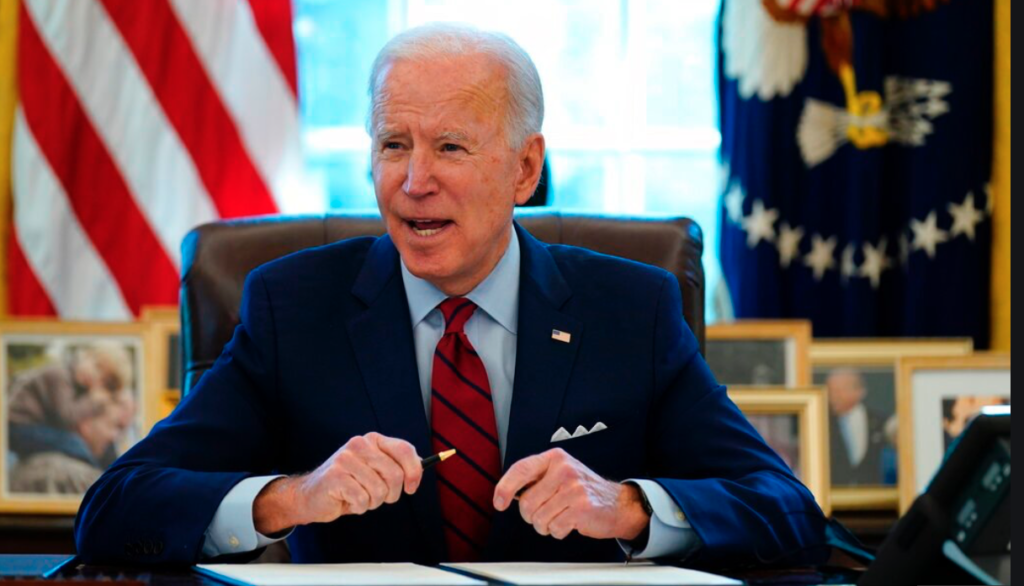Swift Executive Action Meets Atypical Gridlock: Biden’s First Days in Office Produce Important Accomplishments, but Include Stark Challenges

Image Courtesy of KTLA
By Justin Lamoureux
In the hours after taking office, President Biden hit the ground running. Recognizing the urgency of his inherited circumstances, he wasted no time in discharging political edicts. Faced with a laundry list of unprecedented national crises and a slew of demands from his own party, his White House immediately became one of pragmatism and executive might.
While Biden hopes to pursue an ambitious legislative agenda, a majority of his early accomplishments can be attributed to executive orders. Inauguration Day alone saw Biden enact 17 executive orders, most intended to reverse the effects of Trump’s most controversial exercises. Biden’s earliest proclamations included ending the construction of Trump’s signature wall on the U.S.-Mexican border by proclaiming the “immediate termination” of the national emergency declaration Trump used to fund it. He also canceled the permit for the Keystone XL pipeline to move oil from Canada to the Gulf of Mexico (which had long attracted the enmity of environmentalists), and issued a memorandum to strengthen Deferred Action for Childhood Arrivals for certain undocumented immigrants who were brought to the U.S. as children.
Since January 21, Biden has signed an additional 25 executive orders. These include (but are not limited to) initiatives to strengthen the healthcare system—namely, the Affordable Care Act and Medicaid—and respond more vigorously to climate change. One of the most pragmatic elements of the latter was an order to rejoin the Paris Climate Agreement, from which the U.S. had previously withdrawn in 2017.
While Biden has been occupied with addressing some of the country’s most exigent needs, the U.S. Senate has focused on confirming his cabinet nominees. During Biden’s first week in office, four of his cabinet nominees have been confirmed by the Senate. These include Treasury Secretary Janet Yellen, Secretary of State Antony Blinken, Defense Secretary Lloyd Austin, and Director of National Intelligence Avril Haines. It should be noted that three are unprecedented in their roles; Yellen and Haines are each the first woman to hold their respective position, while Austin is the first African-American to serve as Defense Secretary. Biden has been praised for selecting the most diverse cabinet in American history.
An additional three nominees have participated in hearings, while Alejandro Mayorkas – Biden’s pick to lead the Department of Homeland Security (DHS) – has overcome attempts by Senate Republicans to stall his nomination in committee. Hearings are scheduled for an additional six cabinet nominees, while over a dozen are currently being evaluated by their respective Senate committees. This process is moving at a considerably slower pace than in previous administrations; traditionally, it is not uncommon for presidents to have several cabinet nominees confirmed on Inauguration Day alone.
Few would argue that Biden’s first days in office have undoubtedly yielded some noteworthy accomplishments. His long-term record, though, will be heavily contingent on the effectiveness of his administration’s office to the COVID-19 pandemic. Biden’s COVID-19 response team entered the White House equipped with a 200-page response plan. Instead of swiftly executing their agenda, however, officials have been made to contend with an unforeseen complication: locating over 20 million doses that should have been distributed to states. The allocation of said vaccines has the potential to derail Biden’s (otherwise attainable) goal of immunizing 100 million people during his first 100 days in office.
A lack of clarity from the outgoing Trump Administration regarding the allocation of crucial resources has left Biden officials scrambling to piece together vaccine distribution plans and coordinate with state health officials. Several (and President Biden himself) have described the situation as “far worse than expected,” and recent public assessments have produced such dire results that many who had worked on the administration’s transition team were left in disbelief.
Many have attributed the dysfunctional nature of vaccine distribution to an existential disconnect between the federal and state governments. Upon receiving doses of the vaccine, states’ individual public health systems were expected to develop their own plans for delegation to residents and healthcare providers. In many cases, this has placed a strain on state officials, who struggle to ensure both their physical distribution and efficient administration.
Biden’s presidency is a mere two weeks young, but he is already well into laying the groundwork for a seemingly effective administration. A host of executive orders early on will grant him leeway to coordinate with Vice President Harris and congressional Democrats regarding legislative matters in the coming weeks and months. What’s more, the confirmation of his cabinet will ensure that his administration can execute its policy objectives.
But don’t tune out just yet; there is still work to be done. Many of Biden’s cabinet officials still need to be confirmed by the Senate, which depending on opponents’ use of the filibuster, could evolve into a complicated (and lengthy) process. Furthermore, ending the spread of the virus in the foreseeable future will require the White House to utilize every resource available. Given the numerous roadblocks and potential complications, this will require substantial effort.





